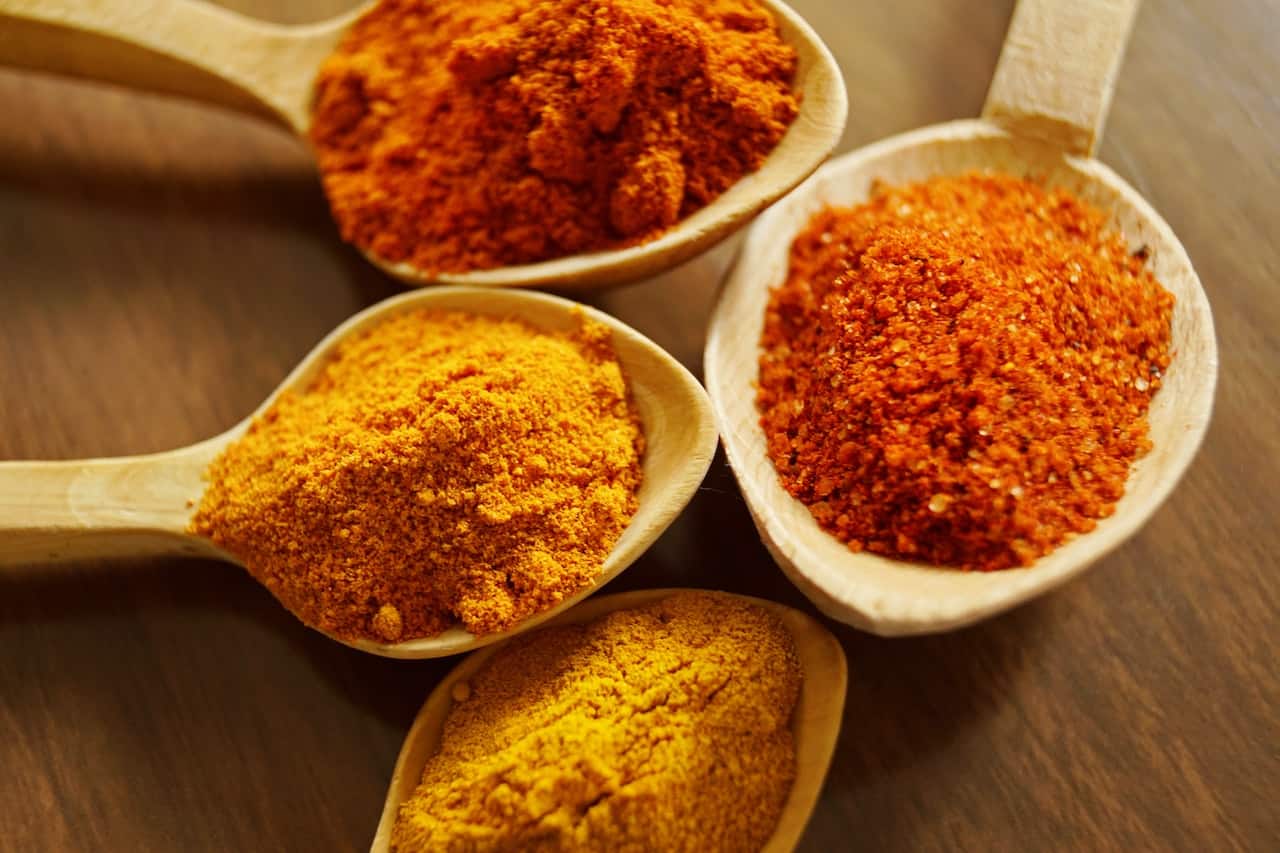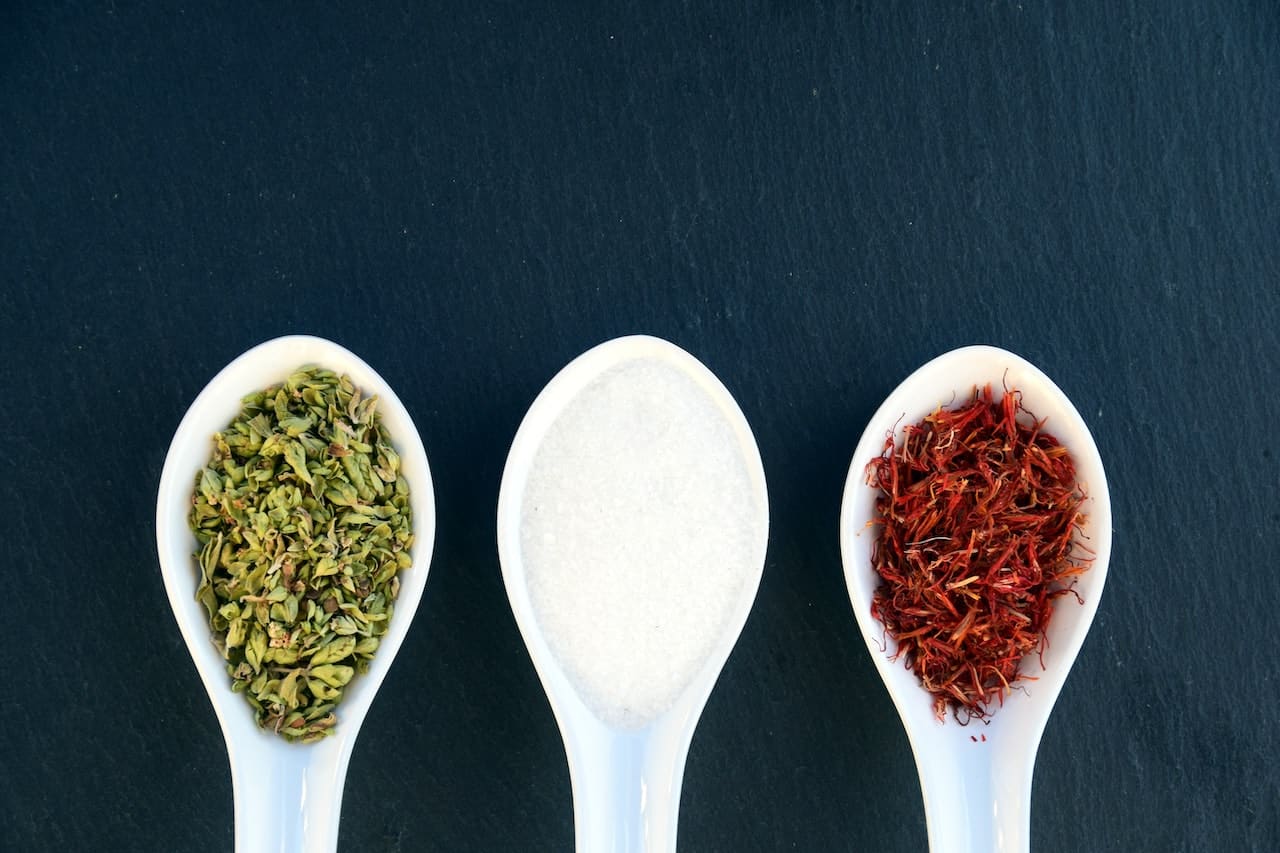Can dogs consume certain spices? Here are several safe spices to eat that may be good for your dog’s health, from lowering inflammation to soothing digestive discomfort. While certain spices and herbs are dangerous and should be avoided, others offer qualities that can be good for your dog’s health. It is crucial to know which spices are safe when to use them, and in what amounts.
While certain spices and herbs are dangerous and should be avoided, others offer qualities that can be good for your dog’s health. It is crucial to know which spices are safe when to use them, and in what amounts. Before including any spices in your dog’s food, we advise that you always speak with your veterinarian. Here are some of the best spices for your dogs to eat.
What is a Spice
The term “spice” in the culinary arts refers to any dried plant component, other than the leaves, used to season and flavor a dish but is not the primary ingredient. Why not use foliage? Because herbs are plants with green, leafy components are utilized in this manner.
Apart from the green leafy section, the whole plant is regarded as a spice, including the dried bark, root, berries, seeds, twigs, and everything else. India is now the greatest user, producer, & exporter of spices in the world. To research spices, they even founded the Indian Institute of Spices Research.
History of Spices
Since South East Asia produces the bulk of the world’s largest spices, the spice trade has been a key contributor to global economic growth since the Middle Ages. From China to Europe, a dangerous and protracted commercial route called the Silk Road was used. Sailing helped to speed up the shipment of spices. Christopher Columbus decided to travel east instead of west to reach India more quickly, landing in North America. It is thought that the incorrect naming of Indigenous peoples as “Indians” resulted from this error in the continents.

Best Spices Good for Dogs
We’ve picked together our best nutrient-dense selections below to help you decide which spices would be a good addition to your pet’s diet, including soothing alternatives for nervous dogs that may help minimize stomach discomfort. Here are the best spices dogs can eat.
🧂Ginger
Ginger is a one-stop shop when it comes to treating nausea, bloating, and digestive problems. It also helps control blood sugar levels, can lessen the discomfort caused by arthritis and age-related joint pain, and may even improve brain function and prevent the development of dangerous tumors.
You may sprinkle your dog’s food with fresh ginger or bake some dog-friendly gingerbread treats. Just be careful not to feed them more raw ginger than one teaspoon per day, as this might lead to heartburn.
🧂Cinnamon
Cinnamon is warming and nutritious, and it also has the ability to reduce the incidence of canine dementia, a condition comparable to Alzheimer’s in humans, as well as heart disease, cancer, and inflammation. Additionally, it works wonders to control blood sugar and fight off free radicals in the body.
Make some handmade pumpkin dog treats or, for something really special, try this delectable pumpkin spiced latte recipe for dogs, as cinnamon & pumpkin are a match made in heaven. We advise using Ceylon cinnamon over the more popular Cassia kind since it contains less of the blood-thinning chemical coumarin.
🧂Basil
Basil is anti-inflammatory and rich in several antioxidants, which are known to protect against various illnesses and disorders, including cancer. It also has a relaxing effect that is particularly helpful for nervous dogs. Oh, and did we forget to add that it can also reduce arthritis-related joint discomfort in dogs? This green plant is capable of everything.
You may either feed your dog a few leaves straight off the plant and a tiny piece of chopped fresh basil leaves as a topping on their food. You may even give your dog a taste of pesto, but make sure it’s a dog-friendly kind without garlic or walnuts, both of which are poisonous to canines.
🧂Cilantro
You may give your dog some basil leaves from off the plant or sprinkle some finely chopped fresh basil on their meal. You could even offer your dog some pesto, but ensure it’s a dog-friendly kind free of walnuts and garlic, both of which are toxic to dogs.
Both handmade dog treats and your dog’s meal can be garnished with cilantro. If they have a stomach ache, it can be very useful. However, take it sparingly to have the intended therapeutic result because taking too much might actually make the condition worse. If your dog is expecting, you should avoid giving her cilantro since it might cause contractions.
🧂Fennel
With the help of this herb is rich in vitamins and minerals and also works wonders to relieve indigestion and freshen breath. You can strengthen your dog’s bones, immune system, and vision. Fennel is a wonderful addition to recipes for dog treats or the best-wet dog food. Fennel should not be used excessively since it has been linked to heart palpitations and respiratory problems.
🧂Dill
Dill is antimicrobial, antifungal, & antibacterial. It also includes a variety of antioxidant flavonoids that have been shown to shield chromosomes from free radicals and oxygen-based damage. Additionally, it has powerful oils like limonene that may aid in boosting the synthesis of enzymes that fight cancer, and it’s an excellent digestive aid that can help with cramps, nausea, and gas.
Make your dog a cup of calming dill seed tea if they are experiencing stomach tension. Combine one teaspoon of dill seeds with eight ounces of warm water, then feed your dog the mixture after it has cooled. If your dog is expecting, stay away from this, as dill has been known to result in miscarriages.
🧂Oregano
Oregano has a strong aroma and earthy flavor. It also contains a lot of vitamins, Omega-3 fatty acids, calcium, iron, & fiber. It has potent antibacterial and antiviral qualities, works wonders to detoxify the body, and is especially effective in easing joint pain and inflammation.
You may buy oregano-flavored dog food or add a little of the fresh herb to your dog’s meal. Add a few oregano leaves to hot water, let it cool, then filter it and give it to your dog to relieve pain and intestinal problems.
🧂Peppermint
Peppermint has a similar impact on canines and is an excellent digestive aid for various digestive ailments. It is well recognized for helping to reduce indigestion and painful stomach and digestive distress in humans. Suppose your dog is suffering from vomiting or diarrhea. In that case, we advise making some peppermint tea for them but keep in mind that it can induce hypoglycemia in people with diabetes and must be avoided if your dog has gastric reflux illness.
🧂Coriander
Dogs enjoy them, which may surprise most of you who don’t like the coriander flavor. Since this herb has several health advantages, including antimicrobial, antibiotic, fungicide, antioxidant, and even anti-cancer characteristics, it is ideal for incorporating into their diet. At the same time, it stabilizes blood sugar levels & helps with calcium absorption.
🧂Parsley
Is your dog’s breath not exactly fresh? Then parsley will save the day! Parsley not only works wonders to freshen your breath, but it also works wonders on itchy skin and urinary tract infections. Additionally, it has diuretic properties that remove waste and toxins from the body, and it contains a lot of chlorophyll, which helps blood cells stay healthy.
Make a parsley drink or soup, or garnish your dog’s food with parsley leaves. Choose curly parsley instead of flat leaf, and stay away from any seeds because they can be poisonous to dogs in large quantities. Parsley shouldn’t be given to pregnant dogs since it might cause labor.
🧂Turmeric
Turmeric, a member of the ginger family with an earthy flavor and a deep yellow hue, is one of the more popular recent additions to dog food. It is well recognized to have potent anti-cancer & anti-inflammatory qualities, and it can also combat free radicals, boost cognitive function, and lessen the uncomfortable symptoms of arthritis.
Because turmeric works as a blood thinner and may combine with other medications to raise the risk of bleeding, we advise consulting your veterinarian before giving this to your dog. However, if your dog isn’t taking any medications and your veterinarian thinks it’s suitable, adding 14 teaspoons to the food of small dogs, 12 teaspoons to the diet of medium dogs, and one teaspoon to the food of large dogs can be extremely helpful.
🧂Kelp
Vitamins A, B1, B2, C, D, & E, as well as the minerals zinc, magnesium, iodine, iron, copper, potassium, and calcium, are all naturally found in sea kelp. It contains anti-aging qualities and helps promote good thyroid function, hair development, and skin elasticity.
Bad Spices for Dogs
❌Onion
Onions and onion powder can quickly upset a dog’s stomach, resulting in vomiting and diarrhea. Sulfoxides & disulfides found in onions can harm red blood cells. This can eventually result in anemia.
❌Cocoa Powder
Similar to chocolate, the cocoa powder may be extremely harmful to dogs. It has a substance in it that is comparable to caffeine, which is bad for a dog’s neurological system. Cocoa powder should never be consumed since it might cause renal and cardiac issues.
❌Nutmeg
Nutmeg can upset your stomach significantly and make you uneasy. After consuming nutmeg, a dog could become extremely eager before being worn out and depleted. Nutmeg is regarded as extremely poisonous to dogs since it has occasionally resulted in death.
❌Salt
Even though we consume salt in almost every meal as people, our dogs’ diets do not benefit from this. Dehydration results from increased thirst and urine caused by salt. Ingesting more of it can also result in nausea, diarrhea, & vomiting.
❌Caraway
A dangerous illness characterized by seizures, blood thinning, & organ damage is caraway poison in dogs.
❌Sorrel
Dogs that have ingested sorrel may have mouth burning, upset stomach, &, in extreme circumstances, convulsions and low calcium in the blood levels.
❌Tarragon
Tarragon consumption can make dogs experience gastrointestinal issues, including nausea & diarrhea.
Before Giving Your Dog Herbs and Spices
Before introducing any herbs or spices to your dog’s food, you should always speak with your veterinarian. It’s crucial to abide by any warnings and instructions provided by your veterinarian, especially if you’re taking herbs and spices as supplements rather than in their natural state. Keep in mind that manufactured supplements may include harmful substances.
Everything we use with our pets comes with a good and a negative list. The same holds true with spices and herbs. I like to present bad or dangerous news first, so I’ll list the herbs and spices that are harmful to your dog first. After that, we’ll go through the fantastic list of healthy herbs and spices.
Spices & Herbs Dogs Shouldn’t Eat
Given that medical measures are frequently expressed in kilograms, 1 kilogram (kg) equals 2.2 pounds (lbs).
📌Allspice
It should not be consumed since it contains eugenol. Small amounts, like baked items, will probably not be an issue. Eugenols have the potential to raise heart rate and slightly lower body temperature. Vomiting can happen when a dose level of roughly 2.5 grams per Ten kg of body weight is consumed.
📌Cayenne
It is not poisonous, but it can seriously irritate your dog’s eyes, nose, & throat. If consumed, it may result in diarrhea, vomiting, gastrointestinal burning, irritability, and discomfort.
📌Cocoa Powder
Extremely harmful to dogs. Up to 26mg of theobromine are present per gram. With as low as 20mg per kg of body weight or 9mg per pound of body weight, mild to moderate hazardous effects might manifest. Effects can start to show in as little as 0.14 ounces (4 grams) of the most poisonous form, powders, for a ten-pound dog. Use this chocolate calculator for extra assistance. Vomiting, diarrhea, trembling, an accelerated heartbeat, convulsions, and even death are symptoms of toxicity.
📌Bay Leaf
It is poisonous to dogs because it contains eugenols or other essential oils. Consumption may result in nausea and diarrhea. Dogs can get intestinal blockage if they swallow a lot of big leaves.
📌Cloves
Unless they are taken in huge quantities as an oil or powder, they are generally harmless for dogs. The consequence might be liver damage from the eugenols that cloves contain.
📌Chives
Akita, Shiba Inu, and other Japanese breeds are more sensitive than other dog breeds. It damages red blood cells by rupturing them, which can result in anemia. Additionally, some pets have gastrointestinal symptoms such as drooling, nausea, vomiting, diarrhea, and abdominal pain.
📌Curry
The degree of heat in various curries varies. Despite not being immediately harmful, it should be avoided as it can seriously upset the stomach and result in vomiting and explosive diarrhea.
📌Hops
If consumed by dogs, they can be quite harmful. After intake, they may result in malignant hyperthermia, a potentially fatal rise in body temperature. Other signs include excitement, a fast heartbeat, vomiting, diarrhea, & panting. Although a delayed reaction is uncommon, symptoms can appear as soon as 30 minutes after intake or up to 8 hours later. The fact that hops poisoning may be treated, provided that timely veterinary treatment is sought is a plus.
📌Mustard Seed
It is poisonous to dogs and can make you throw up and have diarrhea if you eat it.
📌Marjoram
Dogs are harmful to it. It has digestive irritants that make people salivate, throw up, and have diarrhea. Additionally, it has been discovered to reduce blood sugar & slow the heart rate.
📌Nutmeg
Myristicin, a poison, is present in it. Small doses are unlikely to result in anything more severe than gastrointestinal distress (vomiting and diarrhea). However, excessive use can cause hallucinations, confusion, a faster heartbeat, dehydration, high blood pressure, a dry mouth, stomach discomfort, and even convulsions.
📌Paprika
Although it is not harmful, it is best to avoid it because it might irritate your digestion.
📌Spanish Thyme
Toxic to both dogs and cats. Along with other harmful oils, it includes the diterpene plant compound. Anorexia, diarrhea, drinking too much and peeing too much, sadness, trouble breathing, & vomiting are some signs of poisoning.
Benefits of Spices for Dogs
These recommendations are a fantastic place to start when it comes to meeting basic nutritional needs, but the inclusion of spices and herbs mimics the more innately natural ancient diet. Delicious herbs and a variety of additional spices & superfoods, such as chia seeds, kelp, and turmeric, are used in every Different Dog dish.
Antioxidants & polyphenols are abundant in spices and herbs. Herbs’ green chlorophyll functions as a potent antioxidant, encouraging both external and internal toxin elimination. They can be utilized medicinally and help to alkalize the body. Herbs can also provide fiber, protein, vitamins, and minerals to the food you feed your cat. A glass of milk has the same amount of calcium as only two tablespoons of dried basil.
Your dog may enjoy a wide range of tastes thanks to herbs. Similar to us, dogs have preferred flavors and tastes, so variety is essential to promoting good health & keeping your dog content & interested in their diet.
How to Store Spice
Keeping spices in a cold, dry environment extends their shelf life. Therefore, putting spice jars next to your stove can drastically shorten their usable life. Your spices will retain their flavor longer if you store them in an opaque container or in an enclosed spice rack.
Frequently Asked Questions
Are spices healthy for dogs?
Coriander, parsley, and oregano are safe seasonings for dogs. They are loaded with nutrients that are good for your dog’s wellness. The choice of dog meals that fulfill both the safe and healthy feeding requirements can be difficult for many pet parents.
Do dogs require spices?
In fact, certain spices may be toxic to dogs, and they don’t require them to be healthy. However, some spices have nutritional advantages for our dogs, particularly those with particular medical issues.
Which spices are safe for dogs’ stomachs?
One of the greatest spices for dogs to aid with nausea, bloat, & digestive problems is ginger. Additionally, it lowers blood sugar levels, eases age-related and arthritic joint pain, and is even thought to improve brain function & stop the spread of dangerous tumors.
Can you prepare homemade dog food with spices?
Boost the food’s flavor. Add a dash of cayenne pepper spice for a spicy dinner to each serving of homemade dog food. With its heart-strengthening and anti-inflammatory effects, pepper can help dogs with arthritis discomfort. Add ginger to dog food seasoning.
Does oregano benefit dogs?
Plenty of nutrients. Oregano helps your dog’s daily nutritional requirements and gives dog food a taste. Vitamins A, C, & K, fiber, omega-3 fatty acids, calcium, iron, & manganese are all abundant in oregano. It also contains plenty of antioxidants, which fend against free radicals & stop cell deterioration.
Do spices poison animals?
Knowing which spices to avoid is crucial since some spices can be toxic to dogs. Some spices have the potential to harm dogs. Common spices like nutmeg, cloves, and garlic are included in this list. Always err on the side of caution and leave a spice out of your dog’s food if you need to check if it’s healthy for them to eat.
Final Thoughts
Everything is well now that you know the best spices for dogs. As you see, if you know which are acceptable, spices and herbs may be a tasty and healthy addition to a dog’s diet. Your dog will give you the thumbs up if you add some basil or parsley to his goodies. Avoid well-known poisonous spices and herbs like nutmeg, chocolate, salt, and garlic. Before including them in your pet’s food, discussing pet-safe spices and herbs with your veterinarian is a good idea. And keep in mind that not all herbs are secure for canines.


